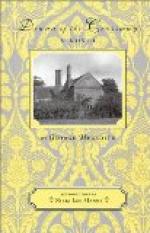’I fancied when you were announced that you came for congratulations upon your approaching marriage, Percy.’
’I shall expect to hear them from you to-morrow evening at the station, dear Tony,’ said he.
The time was again stated, the pledge repeated. He forbore entreaties for privileges, and won her gratitude.
They named once more the place of meeting and the hour: more significant to them than phrases of intensest love and passion. Pressing hands sharply for pledge of good faith, they sundered.
She still had him in her eyes when he had gone. Her old world lay shattered; her new world was up without a dawn, with but one figure, the sun of it, to light the swinging strangeness.
Was ever man more marvellously transformed? or woman more wildly swept from earth into the clouds? So she mused in the hum of her tempest of heart and brain, forgetful of the years and the conditions preparing both of them for this explosion.
She had much to do: the arrangements to dismiss her servants, write to house-agents and her lawyer, and write fully to Emma, write the enigmatic farewell to the Esquarts and Lady Pennon, Mary Paynham, Arthur Rhodes, Whitmonby (stanch in friendship, but requiring friendly touches), Henry Wilmers, and Redworth. He was reserved to the last, for very enigmatical adieux: he would hear the whole story from Emma; must be left to think as he liked.
The vague letters were excellently well composed: she was going abroad, and knew not when she would return; bade her friends think the best they could of her in the meantime. Whitmonby was favoured with an anecdote, to be read as an apologue by the light of subsequent events. But the letter to Emma tasked Diana. Intending to write fully, her pen committed the briefest sentences: the tenderness she felt for Emma wakening her heart to sing that she was loved, loved, and knew love at last; and Emma’s foreseen antagonism to the love and the step it involved rendered her pleadings in exculpation a stammered confession of guiltiness, ignominious, unworthy of the pride she felt in her lover. ’I am like a cartridge rammed into a gun, to be discharged at a certain hour tomorrow,’ she wrote; and she sealed a letter so frigid that she could not decide to post it. All day she imagined hearing a distant cannonade. The light of the day following was not like earthly light. Danvers assured her there was no fog in London.
’London is insupportable; I am going to Paris, and shall send for you in a week or two,’ said Diana.
‘Allow me to say, ma’am, that you had better take me with you,’ said Danvers.
‘Are you afraid of travelling by yourself, you foolish creature?’
’No, ma’am, but I don’t like any hands to undress and dress my mistress but my own.’
‘I have not lost the art,’ said Diana, chafing for a magic spell to extinguish the woman, to whom, immediately pitying her, she said: ’You are a good faithful soul. I think you have never kissed me. Kiss me on the forehead.’




